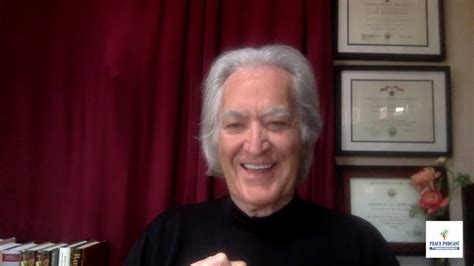A Quote by D. H. Lawrence
Plant consciousness, insect consciousness, fish consciousness, all are related by one permanent element, which we may call the religious element inherent in all life, even in a flea: the sense of wonder. That is our sixth sense, and it is the natural religious sense.
Related Quotes
Ultimately, there is no such thing as "my consciousness," but just the one consciousness and to sense your connectedness with the one (I can sense that continuously, which is why I can say that I know this for sure) to sense that connectedness with the one consciousness that pervades the universe, which in some traditions is called God, to sense that frees you of fear, from anxiety, and takes you to a very deep place of peace, but also of heightened aliveness.
I consider morals and aesthetics one and the same, for they cover only one impulse, one drive inherent in our consciousness - to bring our life and all our actions into a satisfactory relationship with the events of the world as our consciousness wants it to be, in harmony with our life and according to the laws of consciousness itself.
The cognitive structure does not generate consciousness; it simply reflects it; and in the process limits and embellishes it. In a fundamental sense, consciousness is the source of our awareness. In other words, consciousness is not merely awareness as manifest in different forms but it is also what makes awareness possible.
If we hope to stem the mass destruction that inevitably attends our economic system (and to alter the sense of entitlement - the sense of contempt, the hatred - on which it is based), fundamental historical, social, economic, and technological forces need to be pondered, understood, and redirected. Behavior won't change much without a fundamental change in consciousness. The question becomes: How do we change consciousness?
There can be no more intimate and elemental part of the individual than his or her own consciousness. At the deepest level, our consciousness is what we are - to the extent that if we are not sovereign over our own consciousness then we cannot in any meaningful sense be sovereign over anything else either.
e idea of a personal God is quite alien to me and seems even naive. However, I am also not a "Freethinker" in the usual sense of the word because I find that this is in the main an attitude nourished exclusively by an opposition against naive superstition. My feeling is insofar religious as I am imbued with the consciousness of the insuffiency of the human mind to understand deeply the harmony of the Universe which we try to formulate as "laws of nature." It is this consciousness and humility I miss in the Freethinker mentality. Sincerely yours, Albert Einstein.
Dreams are imperfections of sleep; even so is consciousness the imperfection of waking. Dreams are impurities in the circulation of the blood; even so it's consciousness a disorder of life. Dreams are without proportion, without good sense, without truth; so also is consciousness. Awake from dream, the truth is known: awake from waking. The truth is: The Unknown





































